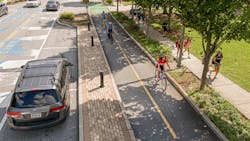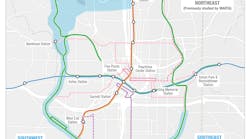Atlanta Regional Commission Board approves major update to Atlanta MTP
The Atlanta Regional Commission (ARC) Board has approved a major update to the Atlanta Metropolitan Transportation Plan (MTP), which allocates $168 billion in federal, state and local funding through 2050 to improve transportation and safety across the 20-county region in Atlanta, Ga.
The MTP is designed to accommodate significant growth that is expected to occur during the next 30 years. ARC forecasts the Atlanta region will add 1.8 million people by 2050, bringing the metro area’s total population to 7.9 million.
The long-range plan includes investments that will improve roads and highways, enhance transit options, expand the region’s network of bike-ped trails and encourage alternative commuting options such as carpooling and teleworking.
“The Atlanta Metropolitan Transportation Plan is a bold blueprint that will keep our region moving forward in the decades to come,” said ARC Board Chair Andre Dickens, who also serves as mayor of the city of Atlanta. “These investments will help improve quality of life and ensure that our economy remains strong.”
Working in close collaboration with local governments and transportation agencies, the ARC coordinates major updates to the MTP about every four years.
Highlights of transportation projects included in the MTP
Constructing and sustaining transit services
The plan programs $10 billion for transit expansion. Projects scheduled to begin in the next decade include:
- Campbellton Road bus rapid transit (BRT), from Oakland City Metropolitan Atlanta Rapid Transit Authority (MARTA) station to Greenbriar Mall.
- Clayton Southlake BRT, from College Park MARTA station to Southlake Mall.
- Atlanta Streetcar East Extension, from Jackston Street to Atlanta BeltLine/Ponce City Market.
- Buford Highway Arterial Rapid Transit, from Lindbergh MARTA station to Doraville MARTA station.
- Candler Road Arterial Rapid Transit, from Avondale MARTA station to Georgia State University Perimeter College.
About $105.5 billion, or 63 percent of the total budget, is earmarked to maintain, modernize and operate transportation infrastructure that’s already in place. Projects include resurfacing roads, repairing bridges and replacing aging buses and rail cars.
Expanding a regional bicycle and pedestrian network to connect communities and provide new travel options
Promoting pedestrian and cyclist-friendly development is an essential component of the MTP, aligning with the Atlanta region’s broader ambitions of enhancing livability, addressing climate imperatives, bolstering safety, alleviating traffic congestion and achieving healthy air quality.
The MTP invests $3.9 billion to construct bike-ped projects across the region through 2050.
Mobility alternatives
About $5.8 billion is dedicated to programs that reduce congestion by encouraging alternative ways of getting around the region, including funding for initiatives such as the Georgia Commute Options program that help people change their travel behavior, whether that means carpooling, using transit, traveling at off-peak hours or teleworking.
The final step in the MTP approval process is receipt of a conformity determination from the United States Department of Transportation, which signifies the plan meets all federal metropolitan planning requirements and the region can move forward with implementation. That decision may take up to 30 days following submittal of all documentation by ARC.
The full list of transportation projects under the MTP can be found here.




